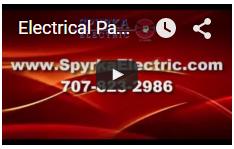If you’re wondering whether you really need a backup generator installation or you want one but need help finding the right kind, it’s time to talk to an electrician. Everybody can benefit from having a standby generator. Small generators cover the bare necessities, and larger ones keep you safe from frequent or prolonged outages.
Backup generator installation is an upfront investment that protects your home for many years. With proper wiring and maintenance by your local electrician, you never have to lift a finger to get peace of mind. Talk to us about backup generator installation if you fall into any of these categories:
- Your Sonoma or Marin County neighborhood experiences regular power outages
- You’re concerned about the next natural disaster or PGE outage that might last days or longer
- You need backup generator power for medical equipment, home security, or running a business
Choosing the Right Size Backup Generator

Proper generator sizing is paramount. If you spring for a larger one than you need, not only will the backup generator installation cost more but so will the maintenance and fuel. Yet a generator that’s too small can feel like a wasted effort if you’re still inconvenienced during a power outage.
Make a list of everything you’d want to run on the generator. Then make a list of each of those appliances that you might run at the same time. Your backup generator installation will have to give you enough power for the largest energy needs and peak loads.
Use this appliance energy calculator to add up the watts. Common examples:
- Large HDTV: 234 watts
- Refrigerator: 225 watts
- Toaster oven: 1051 watts
- Garage door opener: 400 watts
Let an Electrician Perform Backup Generator Installation
Standby generators are not plug-and-play devices. Backup generator installation involves rewiring at the breaker panel, wiring a new subpanel, and other difficult tasks. Everything needs to be wired correctly to your appliances work—and also so that power can safely transfer back to the grid when an outage is over. Most importantly, the job needs to be done perfectly so that your generator can run safely when you need it to.
After sketching your own estimates for the load calculation, talk to an electrician to confirm the numbers. Then we can inspect your existing panel and determine the best options for backup generator installation. Electricians also know how to handle the permits and regulations for installing a generator.
Install a Transfer Switch for a Portable Generator
If a small portable generator satisfies your needs for backup power, ask your electrician to install a transfer switch or interlock kit. This lets you power your service panel from the portable generator so you can use appliances that can’t be plugged in—like HVAC, water heaters, and security systems.
Transfer switches and interlock kits make it safe to switch to portable generator power when you need it. They are easy to use and you won’t risk damaging the local utility lines or your appliances.
Whether you want a portable generator switch or a dedicated backup generator installation, contact us to ensure you get the right equipment and wiring.

